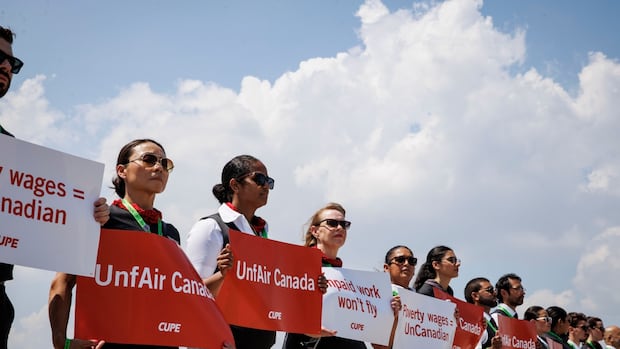Air Canada flight attendants on Saturday overwhelmingly voted against the airline’s latest wage offer, their union said — a vote that’s expected to have no impact on flight operations.
The tentative deal, which ended a strike at the airline last month, includes a 12 per cent salary increase this year for most junior flight attendants and an eight per cent bump for more senior members, followed by smaller raises in subsequent years.
The Canadian Union of Public Employees (CUPE) said in a statement that 99.1 per cent of members rejected the proposal, arguing flight attendants would still earn less than federal minimum wage.
“The wage issue is now in mediation and, if necessary, will be resolved in arbitration,” the CUPE statement read.
Air Canada in a statement confirmed that the issue is now in mediation.
The fallout of a recent Air Canada strike is amplifying calls for more domestic airline competition. For The National, CBC’s Karen Pauls breaks down what it would take to get more companies flying in Canada and why not everyone thinks it’s the right solution.
“We deeply appreciate the patience and the confidence our customers have shown as we worked through this process,” the airline said.
“The parties also agreed that no labour disruption could be initiated, and therefore there will be no strike or lockout, and flights will continue to operate,” the airline said.
The three-day flight attendants strike ended Aug. 19 with the help of a federal mediator after it upended thousands of customers’ travel plans.
CUPE on Saturday criticized the federal government for what it deemed meddling.
“The federal government’s intervention in the negotiations had a corrosive effect that was impossible to ignore,’ the union said.
“Rather than remaining neutral, it distorted the balance of the process by offering Air Canada the leverage to limit the wage increases offered to flight attendants.”
A spokesperson for Minister of Jobs and Families Patty Hadju confirmed in a written statement Saturday evening that the “parties committed, in the event of a failed ratification, to final and binding arbitration to finalize a new collective agreement.”







